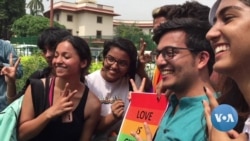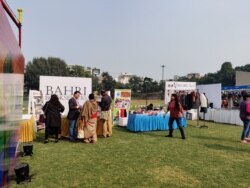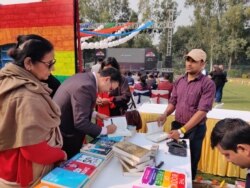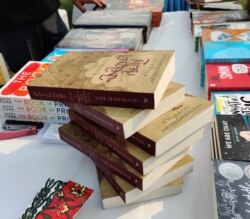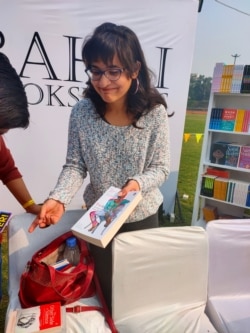Marketing consultant Bhuwan Kathuria was among those who had flashed victory signs outside the Supreme Court in September last year when homosexuality was legalized in India. But along with the celebrations came the sobering realization that creating safe and liberal spaces for the community would not be easy in a country where the 157-year-old ban on gay sex had forced many to live in the shadows.
That is why 16 months after the landmark judgment, Kathuria joined the first ever queer literature festival hosted at an upscale venue in the Indian capital, New Delhi. As the Rainbow Lit festival turned the focus on stories and experiences of the community, he and other gay rights activists hoped to create bridges between different identities of society.
“Festivals like these help us figure out the common ground and also talk about the challenges that lie ahead of us,” he says.
Festival Director Sharif Rangnekar says he organized the meet because he found that queer art and literature did not get enough attention in literary festivals held around the country. “We are talking about existence and coexistence, because there is a whole world out there that has forgotten how to get along,” he says.
While there is an existing body of queer literature in India, the past year has witnessed a surge in creative expression of the community whether in performing arts, films, or books. Much of it comes from a newfound sense of security provided by legal sanctity for homosexuality.
Devdutt Pattanaik, author and mythologist, says he finds a new perspective in recent writings. “There were people who have been writing but it was always from the point of view of being repressed, of being sidelined. Now it is just part of storytelling, it is mainstreaming.”
Among those who have authored a book recently is Nemat Sadat, a US-based Afghan journalist and activist, who published his debut book, “The Carpet Weaver” about an Afghan gay man’s struggle in India. He points out that with homosexuality facing a ban in Islamic countries in South Asia – Afghanistan, Bangladesh and Pakistan – India can be a torch bearer for the community in the region. Sadat was the first person from Afghanistan to publicly come out as gay.
“This is the place where I can truly be my full self, not have to hide anything, not have to prove anything. I am embraced here, I am welcomed here,” according to Sadat. He is optimistic that the gay community in India is “poised to create fiction where LGBTQ people have leading roles and that is what you will see more and more now.”
And it is not just authors and filmmakers who are exploring the subject. Rights activists point to the growing number of videos that young people have been posting in the past year on the popular social networking, video sharing app, TikTok, openly expressing and celebrating their identity. It’s a huge step forward in a country where most of the community remained in the closet for decades.
A rapt audience also heard that alternate sexuality had been an intrinsic part of the country’s literature and art and was openly depicted in sculptures for centuries before it was banned during the colonial era.
“India has had a long, long tradition of homosexuality, of queer, of a third gender being absolutely normal and part of the society and that is depicted very very finely in Urdu and Persian poetry,” according to Saif Mahmood, a lawyer, equal rights activist and author who has written a book “Beloved Delhi” on Urdu poets in the 18th and 19th centuries.
Such messages were important for both young and old who turned up at the festival. Divya Gulati, a Delhi University undergraduate student, buys a book “Facing the Mirror” that relates stories of lesbian experience from across India. “You learn new things from different people even if it is interacting with audience, or hearing people share their experiences through art, through literature, it does really bring a shift from within you,” says Gulati after listening attentively to the talk on how Indian culture was no stranger to homosexuality.
Acceptance of diversity remains an uphill task according to festival director Rangnekar who points out that although social perceptions are changing, this has not led to the creation of “inclusive” spaces for the community. But he is optimistic that the focus on queer art and literature is a step in that direction.
“It's not a one-night stand. It's going to take its own time to get there but we need to start somewhere,” he says.




